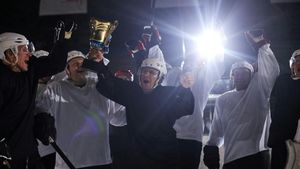The political scene in Germany is heating up as the newly formed party, Bündnis Sahra Wagenknecht – Vernunft und Gerechtigkeit (BSW), gears up for the upcoming 2025 Bundestagswahl. Founded in January 2024, BSW emerged from the association of the same name established just the year before. Currently, the party is represented by ten members in the Bundestag, including Sahra Wagenknecht, who has become the face of the party as its Spitzenkandidatin (lead candidate).
Wagenknecht has propelled the party forward by advocating for policies centered around economic reason, social justice, peace, and freedom. The group seeks to dismantle market-dominant corporations and halt privatization efforts within sectors such as health and housing. Despite its leftist economic stance, BSW voices more conservative social views, calling for the promotion of national states and rejecting gender-neutral language.
The BSW's debut on the electoral scene came during the 2024 European elections, where the party managed to secure 6.2 percent of the vote. This achievement sparked optimism for its future endeavors, especially since it has already engaged within the regional governments of Brandenburg and Thuringia since their respective elections.
According to reports, the BSW is determined to use the 2025 Bundeswahl as a platform to strengthen the economy through support for small businesses and fostering social cohesion. Prioritizing community well-being over profit, the BSW proposes policies aimed at lowering energy prices, including the potential nationalization of energy networks and increased reliance on fossil fuels imported from Russia.
Yet, as the election looms on the horizon, internal conflicts threaten the party's stability. Strains within the BSW have become increasingly apparent, particularly following its participation with the AfD and parts of the FDP to approve the controversial “Zustrombegrenzungsgesetz” (influx limitation law). Just last week, six BSW members, including key figures from the state board, announced their departures, expressing dissent over the party's alignment with right-leaning agendas. "It is unacceptable for us to be outvoted by members of the CDU and FDP on humanitarian issues," they stated, solidifying concerns about the BSW moving toward populist positions.
Wagenknecht's own political future hangs on the impending elections, and she has publicly acknowledged the stakes. "The election is, of course, also the decision about my political future," stated Wagenknecht, emphasizing the importance of securing seats within the Bundestag if she intends to maintain any influence within German politics.
For her, the stakes could not be higher. Her party's credibility is already being questioned, with recent polling indicating the BSW may fall short of the five percent threshold necessary to enter the Bundestag. This is particularly alarming considering the former party she was part of, Die Linke, is performing significantly stronger. “If you’re not sitting in the Bundestag, you’re irrelevant,” she pointed out, sounding the alarm over her party's prospects.
Adding to the complexity of the BSW’s situation is the recent decision by the Verwaltungsgericht Köln (Administrative Court of Cologne), which ruled against the party's claim for inclusion in the prominent ARD format “Wahlarena,” set to feature major party candidates shortly before the election. The court found no obligation to invite the BSW, stating it did not achieve the necessary standing compared to larger parties like the CDU/CSU, AfD, SPD, and Die Grünen. This ruling has raised questions about media equity and the logistical realities facing minor parties trying to signal their messages to voters.
Despite the setbacks, Wagenknecht remains unyielding. She has recently ignited controversy by criticizing former Chancellor Angela Merkel, holding her partially responsible for the rise of the AfD through her migration policies. “Merkel is the mother of the AfD and many problems faced by our country today,” Wagenknecht claimed, demanding more self-reflection from the former leader. Onlookers are curious to see how this confrontation plays out against the backdrop of the election.
This conflict with Merkel echoes throughout the German political sphere, where the intersection of migration, integration, and identity politics remains contentious. The BSW’s agreed-upon principles appear to clash with the emergent public sentiment around these issues, raising the stakes higher for every faction involved.
Faced with internal strife and sharp external criticism, BSW now finds itself at a crossroads. With each passing day, the countdown to the 2025 elections grows ever nearer, putting Sahra Wagenknecht’s leadership skills and the viability of her party to the ultimate test. Whether the BSW can unify its fragmented paths and resonate with enough voters to make its mark on the upcoming election is now the question swirling around this embattled yet determined group.



